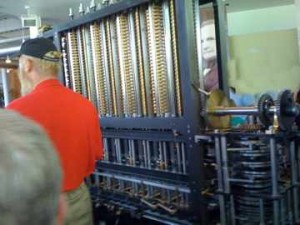The Role of Human Conflict in Technical Innovation
/ Last week I had the pleasure of visiting The Computer History Museum (down the street from the GooglePlex and also housed in ex-Silicon Graphics avant garde architecture). My friends and I went to see Charles Babbage’s “Difference Engine No. 2.” Nathan Myhrvold, former CTO and Group VP at Microsoft, commissioned the London's Science Museum to have this technical marvel built from Babbage’s plans and is allowing The Computer History Museum to display and run the engine before taking personal possession. So where’s the conflict?
Last week I had the pleasure of visiting The Computer History Museum (down the street from the GooglePlex and also housed in ex-Silicon Graphics avant garde architecture). My friends and I went to see Charles Babbage’s “Difference Engine No. 2.” Nathan Myhrvold, former CTO and Group VP at Microsoft, commissioned the London's Science Museum to have this technical marvel built from Babbage’s plans and is allowing The Computer History Museum to display and run the engine before taking personal possession. So where’s the conflict?
This difference engine should have been the first automatic digital computer – albeit made of machined parts and requiring a steady two-handed grip to “crank” the evaluation of polynomials, to 31 digits no less. However, Babbage never saw his design built.
From The Computer History Museum’s presentation - Why Babbage Failed:
Runaway costs, high precision, a disastrous dispute with his engineer [Joseph Clement], fitful financing, political instability, accusations of personal vendettas, delays, failing credibility and the cultural divide between pure and applied science, were all factors..... The relationship between Babbage and Clement collapsed following a dispute about compensation for moving Clement's workshops to a site close to Babbage's house.
The physical portions of the innovation worked, just not the social aspects.
I was drawn to this example as it shows how social and technical aspects are crucial throughout the innovation process. Social and technical components of innovation intertwine in the invention, development, implementation, and certainly use of technology in organizations. However, due to the social component’s more abstract nature, it is often left out of planning, budgeting, and impact assessments – all to the detriment of the system’s ultimate success.
“Socialtechnical” is not going to become a household word, so how can we raise social issues in innovation to their rightful, crucial, explicit role? Examples of how this has been done at any stage in the innovation process would be great grist for the mill. …or if we want to practice Schadenfreude, feel free to provide examples of what happens when social issues are not considered.







